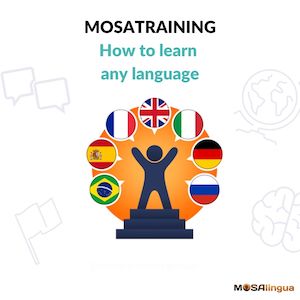We have (almost) all learned a language… And some people inevitably decide to stop, either out of fear of failure, or because of a loss of motivation. Unfortunately, it’s common to lose motivation when you’re learning a language. To help you not to fail at learning a language, today we’re explaining the reasons people sometimes struggle to learn, and how to combat and overcome them.
Are you struggling to learn a language?
Here Are a Few Reasons Why Some People Fail at Learning a Language… and How to Make Sure You’re Not One of Them
Fear of failure, loss of motivation, the wrong learning tools… The reasons some people fail at learning a language are numerous! Rest assured, it happens to everyone, even to polyglots. Learning a language is like a journey: if you’re poorly prepared, it can turn into a disaster. On the other hand, when you’ve got the right tools under your belt, it’ll be plain sailing.
So, this article aims to help you regain your self-confidence, but that’s not all… We will also explain why people fail at learning a language, so that you can avoid falling into the same traps. Then we’ll give you some tips to help you form good habits and reach your most ambitious language goals.
So, why do some people fail at language learning?
1. They “outsource” their learning process
Have you ever thought, said or heard: “Can you teach me…”?
At MosaLingua, that’s what we hear often. One of the most common reasons that some people fail to learn a language? They think it’s someone else’s job. They don’t see it for what it really is: a personal victory. A victory that is up to you, and you alone. That will help you broaden your horizons and that will open many doors for you, personally but also professionally. However, it obviously requires time, willpower, and commitment. Yes, it’s a personal journey. But that doesn’t mean that you shouldn’t have support along the way.
2. They don’t pick the right learning tools
Some people decide to learn a language by themselves, but they often don’t realize that they’ll face a fairly important challenge: choosing the right learning materials. Indeed, there is an infinite choice of online resources. There are so many that you’ll probably have trouble choosing. So how do you choose the right learning resources, no matter what language you are learning?
Here are two tricks:
First, to avoid the umpteenth failure in learning a foreign language, choose a basic resource. That means a resource that can help you with the basics of language learning, such as forming a basic and useful vocabulary bank. Not sure where to start? Don’t panic, we’ve written an article and recorded a video specifically for you, to give you the keys to knowing where to find the right resources.
Then, when you feel comfortable enough, choose some other content. I’m talking about content that can add diversity to your learning process and help you start using the vocabulary you’re learning.
If you want to kill two birds with one stone, try MosaLingua Premium (Web & Mobile). With this app and online learning platform, you don’t just get access to many words and phrases to memorize! You also get videos, articles organized by level, online books and audiobooks, and tons more learning resources that will help you practice this vocabulary and improve your skills. You can try out all these wonderful tools and resources for free!
Once you have chosen your primary learning resource and additional content, the next step is to start practicing daily. Which brings me to the next reason why some people fail at learning a language.
3. They don’t practice regularly
The key to success is regular practice, not talent. People often think that in order to practice a language, you have to sit at your desk and study for hours. Well, they’re wrong! That’s actually something to avoid if you don’t want to get bored and give up.
Instead, integrate your target language into your daily routine. Try to learn vocabulary with your MosaLingua app for about 10 minutes a day. It’s a good start! Once you get used to reviewing the vocabulary (after about thirty consecutive days), complete your practice with other content and activities. If you want to learn more about how to integrate language practice into your routine and how to form good habits, I recommend this video: Challenge – 30 Days to Learn a Foreign Language.
4. Their goal isn’t specific enough
If you don’t have one specific goal, you’ll never achieve it! Photo by: Andy Hall
Not having a clear learning goal is another common mistake among those who fail at learning a language. Just wanting to “learn Spanish” is too vague a goal. Plus, it’s hard to measure. At first, we are all raring to go, hyper-motivated, but it doesn’t last. What can really help you is to rank one or two skills in order of priority and find a more specific goal. Do you want to be able to watch the latest Marvel film without subtitles? Or read your favorite Emile Zola book in French instead of a translation? Those are good, specific goals. You will know once you’ve completed them.
Also keep in mind that your goal could and should evolve as part of your learning process. Whenever you finish your first goal, it’s time to set another one. Here’s a tip: constantly challenge yourself with a new skill to acquire. It’s a good way to stay motivated and improve.
5. They start learning grammar too soon
Grammar is a controversial issue among the language learning community… I’m going to make a simple comparison to illustrate our point of view here at MosaLingua. Would you be able to learn to swim from scratch, just by reading a very detailed book? One that describes all the movements and physical properties involved in swimming, even before entering the water? No? Well… us neither!
Make no mistake, grammar is a wonderful tool. A tool to help you improve once you reach a certain level and begin to feel the urgency to look deeper into the structure of the language. On the other hand, choosing it as the basis of your learning process will only make it harder, less natural, and less fun. We can actually use the same analogy here. The best way to learn to swim is to swim, and the best way to learn to speak a language is, of course, to speak! So don’t start delving into grammar too soon, but don’t put it aside either, if you don’t want to fail at learning a language 😉
6. They don’t start speaking early enough
Waiting until they are “ready” to start speaking and using a language is another reason why many people give up. After all, most of us will never think we are ready enough. However, speaking is an important step if you want to keep moving forward in your learning.
On the one hand, learning a language for most people is a means to an end – which is, ultimately, communication. On the other hand, talking will help you put together all the pieces of the puzzle to make the whole thing look like “the picture on the box.” When you assemble them, you’ll realize how far you have come.
How to learn any language

News flash: those people aren’t any smarter than you are, and they don’t have any kind of special gift for language learning, either. It’s all because of the methods they use. Practicing with the latest and most effective techniques, along with a few expert tips, is a recipe for success.
It can work for you, too! MosaTraining combines all of these tips and techniques into one comprehensive, hands-on approach to language learning.
So, what is our approach? First, talk to yourself! Throughout the day, just try to think about your daily routine and your tasks in your target language. And don’t feel silly – it’s been 12 years since I started learning French, and I still do this! In this way, you will soon have enough confidence to start looking for a language buddy or a correspondent in the language you want and really have fun practicing your language skills.
7. They sabotage themselves
Another common mistake made by people who fail at learning a language is self-sabotage. If I had 10 cents each time someone told me “I really want to learn Spanish but I don’t have the time” or “I’m not good at languages. I don’t think I can learn French…” I’d be a rich woman! Languages may seem to come easier for some people. But the truth is that anyone and everyone can learn a foreign language. For some of us, it may require more patience, more perseverance, better strategies or study habits. Or even a better understanding of how we learn and what works for us. But to say that what’s holding you back is not being talented at languages, is simply not a good excuse.
I want to leave you with a quote from Steve Kaufmann, a Canadian linguist and polyglot: “When you’re learning a language, it is attitude and not aptitude that determines success.” So, now that you have heard all the main reasons why people fail at learning a language, you already know all the pitfalls to avoid and you are ready to make choices that will really help you avoid them.
Video: Why Learning a Language Is an Epic Fail for Some People
It is sometimes easier to wrap your head around info like this when it’s in video form… So Lize recorded one just for you! It tells you what the reasons are for failing at learning a language and gives you the means to not fall into the same traps.
While you’re there, subscribe to our YouTube channel: we publish new and useful videos every week.
Now, roll up your sleeves and get to work! Happy learning!




![How to Say Colors in Spanish and Describe Every Shade in the Rainbow [VIDEO]](https://www.mosalingua.com/en/files/2020/05/colors-in-spanish-mosalingua-300x150.jpg)

Comments